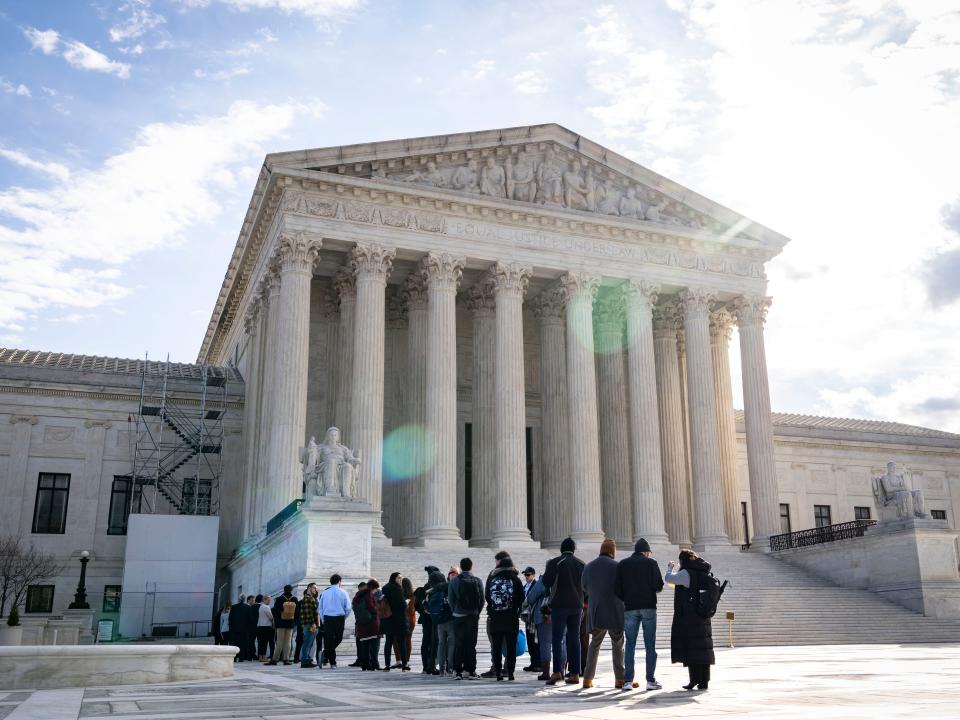Supreme Court rules — just barely — that racial gerrymandering still violates voting rights

The Supreme Court ruled 5-4 Thursday that Alabama violated a ban on racial gerrymandering.
The decision comes as a surprise to court watchers who expected the court to gut the Voting Rights Act.
Chief Justice John Roberts, who often rules against voting rights, wrote the majority opinion.
The Supreme Court held the line against racial gerrymandering on Thursday in a surprise 5-4 decision holding that Alabama violated the Voting Rights Act by creating congressional districts that discriminate against Black voters.
Chief Justice John Roberts and Justice Brett Kavanaugh joined the court's three liberal-leaning justices in the decision, which held that the voting map used in the 2022 congressional elections in Alabama was illegal.
The ruling agreed with the findings of a lower federal court that "Alabama's extensive history of repugnant racial and voting-related discrimination is undeniable and well documented" and "Black Alabamians enjoy virtually zero success in statewide elections," noting that the state of Alabama hasn't challenged that conclusion in its arguments before the Supreme Court.
"The Court sees no reason to disturb the District Court's careful factual findings, which are subject to clear error review and have gone unchallenged by Alabama in any event," Roberts wrote in the majority opinion.
The decision comes as a surprise to many court watchers, who expected the Supreme Court to gut the Voting Rights Act entirely. Right-wing justices currently have a firm 6-3 grip on the court. Roberts, who is often viewed as the most moderate justice appointed by a Republican president, has historically chipped away at voting protections previously enshrined by the Voting Rights Act of 1965. In oral arguments last October, the justices appeared willing to make it harder to challenge redistricting plans as racially discriminatory under the Voting Rights Act of 1965.
In this case, he and Kavanaugh — an appointee of former President Donald Trump — joined Justices Elena Kagan, Sonia Sotomayor, and Ketanji Brown Jackson in upholding the part of the law that forbids racial gerrymandering.
Because of the ruling, Republican-led legislatures in Alabama and Louisiana will have to redraw maps so that they could increase Black representation. It was closely watched for its potential effect on control of the closely divided US House of Representatives.
The other four conservative justices dissented Thursday. Justice Clarence Thomas wrote that the decision forces "Alabama to intentionally redraw its longstanding congressional districts so that black voters can control a number of seats roughly proportional to the black share of the State's population. Section 2 demands no such thing, and, if it did, the Constitution would not permit it."
The Biden administration sided with the Black voters in Alabama.
Attorney General Merrick Garland applauded the ruling: "Today's decision rejects efforts to further erode fundamental voting rights protections, and preserves the principle that in the United States, all eligible voters must be able to exercise their constitutional right to vote free from discrimination based on their race."
Evan Milligan, a Black voter and the lead plaintiff in the case, said the ruling was a victory for democracy and people of color.
"We are grateful that the Supreme Court upheld what we knew to be true: that everyone deserves to have their vote matter and their voice heard. Today is a win for democracy and freedom not just in Alabama but across the United States," Milligan said.

The case stems from challenges to Alabama's seven-district congressional map, which included one district in which Black voters form a large enough majority that they have the power to elect their preferred candidate. The challengers said that one district is not enough, pointing out that overall, Alabama's population is more than 25% Black.
A three-judge court, with two appointees of former President Donald Trump, had little trouble concluding that the plan likely violated the Voting Rights Act by diluting the votes of Black Alabamians. The panel ordered a new map drawn.
But the state quickly appealed to the Supreme Court, where five conservative justices prevented the lower-court ruling from going forward. At the same time, the court decided to hear the Alabama case.
Partisan politics underlies the case, and in a closely divided House of Representatives Thursday's ruling could have a significant effect. Republicans who dominate elective office in Alabama have been resistant to creating a second district with a Democratic-leaning Black majority, or close to one, that could send another Democrat to Congress.
The judges found that Alabama concentrated Black voters in one district, while spreading them out among the others to make it much more difficult to elect more than one candidate of their choice.
Alabama's Black population is large enough and geographically compact enough to create a second district, the judges found.
Denying discrimination, Alabama argued that the lower court ruling would have forced it to sort voters by race and insisted it was taking a "race neutral" approach to redistricting.
At arguments in October, Justice Ketanji Brown Jackson scoffed at the idea that race could not be part of the equation. Jackson, the court's first Black woman, said that constitutional amendments passed after the Civil War and the Voting Rights Act a century later were intended to do the same thing, make Black Americans "equal to white citizens."
The Associated Press contributed to this story.
Read the original article on Business Insider

 Yahoo Sports
Yahoo Sports 